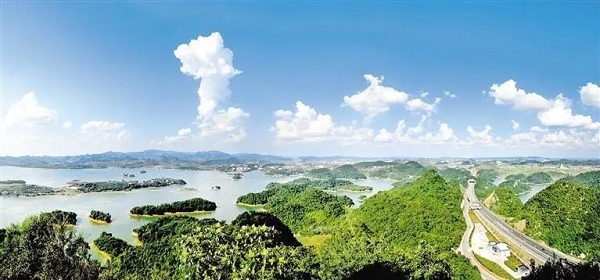Sustainable concepts fully practiced in Qingzhen

The charming scenery of Red Maple Lake in Qingzhen city, Guiyang, Southwest China's Guizhou province. [Photo/gzqz.gov.cn]
Qingzhen city in Guiyang, Southwest China's Guizhou province, has been focusing on creating a sustainable natural environment for locals. Positive results have been gained in water governance, mine restoration, and ecotourism.
Red Maple Lake is most Guiyang people's primary drinking water source. Qingzhen has organized local ecological protection stations, agricultural service centers, and other units to form special work teams to ensure the regular operation of surrounding rural sewage treatment facilities and sewage pipe networks.
In recent years, Qingzhen has committed substantial investments toward the restoration and management of the mining geological environment. The fruition of their endeavors is evident through the stunning transformation of once barren, rocky slopes into awe-inspiring greenery, which has undoubtedly yielded multifaceted benefits for the ecological environment and the entirety of society.
The mining companies, in their unwavering commitment to environmental restoration and ecological compensation, have been actively involved in the implementation of various initiatives aimed at rehabilitating the mining areas and surrounding zones. A notable undertaking includes the planting of trees and greenery, which has contributed significantly to the amelioration of the previously damaged vegetation.
Rural ecotourism then took off in the city, and the charming rural scenery lured travelers. At weekends, parking lots of local scenic sites are filled with tourists' cars.
Over the first quarter of this year, Qingzhen received 2.13 million visits, generating 2.36 billion yuan ($328.04 million) of tourism revenue.
Presented by China Daily.
黔ICP备05001922号-3
